News and Report
Stallion Groups Boss, Sunil Vaswani In N23.3 Billion Debt Mess
Published
4 years agoon
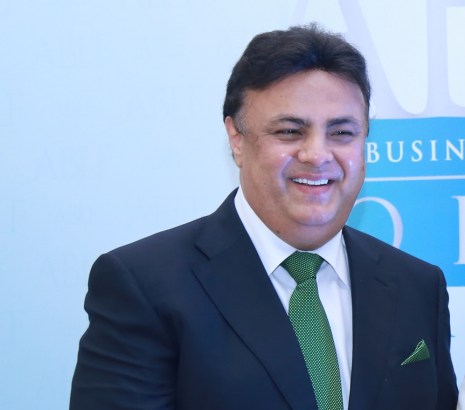
Stallion Groups of Companies’ boss, Sunil Vaswani is in big trouble. Zenith Bank Plc has dragged him before an Igbosere High Court of Lagos State, Nigeria, over alleged unpaid N23,388, 188, 756.049 debt.
Zenith Bank alleged that the suit marked LD/3945GCMW/2020, against Mr. Vaswani, is pursuant to Order 5 Rules 4 of the High Court (Civil Procedure Rules 2009 and under the court’s inherent jurisdiction, was filed due his failure and refusal to pay the alleged debt despite several and repeated demands.
Consequently, the bank through is lawyer, Mr. Kemi Balogun (SAN), who leads Chidozie Ndukwe, Babatunde Olanipekun and five others is asking for an order of the court entering judgment in the sum of N23,388,188, 765. 49, its favour against Vaswani, being his outstanding indebtedness on account of the guarantee given in respect of various sum advanced to Stallion Nigeria Limited which has remained unpaid as at May 12, 2020 in spite of repeated demands.
The bank is also asking the court for a declaration that having regard to the clear and unambiguous provisions of the Deeds of Personal Guarantee and the statement of net-worth executed by Mr. Vaswani in its favour over the huge facilities advanced to Stallion Nigeria Limited, who has failed together with the defendant upon several and repeated demands to liquidate the debt that has arisen therefrom, its entitled to judgment against the Defendant in the sum of N23, 388,188, 765. 049, being Mr. Vaswani’s outstanding indebtedness to it, as May 12, 2020, and interest at the rate awarded by the Court from the date of judgment until final liquidation.
The bank also wants a declaration that having regard to the true construction of the Deed of Personal Guarantee executed by Mr. Vaswani as additional security in its favour, in respect of the huge sum advanced to Stallion Nigeria Limited, it is entitled at law to all the rights attached to Vaswani’s assets, landed properties and other forms of real estates no matter wherever located within the Federal Republic of Nigeria, the United States of America, United Arab Emirates, particularly and not limited to the property known as L9, Lailak Street, Emirates Hills, Emirates Living, the United Kingdom, particularly and not limited to the property known as 40, Avenue Road, London, NWH 8 6H8, and all countries of the European Union and all forms of stock of shares in the equity of any company or investment, cash deposits, bonds wholly or jointly held investments in any Financial Scheme, all forms of negotiable instruments in all Commercial Banks, Discount Houses, Mortgage Banks, Merchants Banks. Savings and Loans, and all licensed Financial Institutions located within the Federal Republic of Nigeria.
The United States of America. United Arab Emirates. particularly and not limited to sums of money contained in accounts domiciled with Rak Bank of Rak Operations Center, Emirates Road, Ras Al Khaimah in the United Arab Emirates (UAE) and Emirates NBD Bank of Baniyas Road, Doha, Opposite Dubai Creek Tower, Next to Dubai Chamber, the United Kingdom, particularly and not limited to sums of money contained In accounts domiciled with Barclays Bank of 2, Churchill PI, Canary Wharf, London E14 5RB, HSBC Bank of 8, Canada Square in Canary Wharf, London and Standard Chartered Bank 1, Basinghall Avenue, London, ECZV 50D, and all countries of the European Union (EU), and any other jurisdictions worldwide until the sum of N23,388,188,765. 49, owed by him to the bank being the guarantee on the unpaid credit faculties obtained by Stallion Nigeria Limited from the Claimant together With accrued interest thereon as at May 12, 2020 is fully realized.
The bank further asked the court for an order vesting in it, all the rights attached to Vaswani’s assets, landed properties and all other forms of real estate wherever located within the Federal Republic of Nigeria, the United States of America, United Arab Emirates, particularly and not limited to the property known as L9, Lailak Street, Emirates Hills, Emirates Living, the United Kingdom, particularly and not limited to the property known as 40, Avenue Road, London, NWH 8 6H5, and all countries of the European Union (EU), and any other jurisdictions worldwide and all forms of stock of shares in the equity of any company or investment.
Cash deposits, bonds, wholly or jointly held investments in any Financial Scheme; all forms of negotiable instruments in all Commercial Banks, Discount Houses. Mortgage Banks. Merchants Banks, Savings and Loans, and all financial institutions located within the Federal Republic of Nigeria, United States of America, United Arab Emirates, particularly and not limited to sums of money contained in accounts domiciled with Rak Bank of Rak Operations Center, Emirates Road, Ras Al Khaimah in the United Arab Emirates (UAE) and Emirates NBD Bank of Baniyas Road, Deira, Opposite Dubai Creek Tower, Next to Dubai Chamber, the United Kingdom, particularly and not limited to sums of money contained in accounts domiciled with Barclays Bank of 2, Churchill Pl, Canary Wharf, London E14 5R8, HSBC Bank of 8, Canada Square in Canary Wharf, London and Standard Chartered Bank 1, Basinghall Avenue, London, ECZV SOD, and all other countries of the European Union (EU) and any other jurisdictions worldwide until the sum N23,388,188,765. 49, owed by the Mr. Vaswani to the bank, on account of the guarantee on the unpaid credit facilities obtained by Stallion Nigeria Limited from the Claimant together with accrued interest thereon as at of May 12, 2020, is fully realized.
The bank also want the court to declare that being an unsatisfied creditor in the sum of N23,388,188, 765. 49, is entitled to an order of perpetual injunction restraining the Defendant from selling, alienating, disposing, transferring any interest in all landed properties and other forms of real estate in the name of the Defendant; cash deposits, bonds, all forms of stock of shares in the equity of any company or investment and all forms of investments wholly or partly held in any Financial Scheme in Mr. Vaswani’s name, all forms of negotiable instruments in all Commercial Banks, Discount Houses, Mortgage Banks, Merchant Banks, and all financial institutions acquired in his name wherever located within the Federal Republic of Nigeria, the United States of America, United Arab Emirates, particularly and not limited to sums of money contained in accounts domiciled with Rak Bank of Rak Operations Center, Emirates Road, Ras Al Khaimah in the United Arab Emirates (UAE) and Emirates NBD Bank of Baniyas Road, Deira, Opposite Dubai Creek Tower, Next to Dubai Chamber, the United Kingdom, particularly and not limited to sums of money contained in accounts domiciled with Barclays Bank of 2, Churchill Pl, Canary Wharf, London E14 5R8, HSBC Bank of 8, Canada Square in Canary Wharf, London and Standard Chartered Bank 1, Basinghall Avenue, London, EC2V SDD, and all Countries of the European Union (EU) and other jurisdictions worldwide, until the sum of N23,388,188,765. 49, owed by Mr. Vaswani, as at May 12, 2020 is fully satisfied.
Zenith Bank while asked for cost of instituting the suit, equally urged the court for an order of perpetual injunction restraining Mr. Vaswani, his agents, representatives, officers, servants, privies, assigns, proxies, estates, trustees, and/or any person, natural or corporate, acting on his behalf in respect of the Defendant’s assets, landed properties no matter wherever located within the Federal Republic of Nigeria, the United States of America, United Arab Emirates, particularly and not limited to the property known as L9, Lailak Street, Emirates Hills, Emirates Living, the United Kingdom, particularly and not limited to the property known as 40, Avenue Road, London, NWH 8 6H8, and all other countries of the European Union (EU), from dissipating, disposing of, selling, transferring, alienating, any moveable or immovable assets, moneys, shares, and all forms of stock of shares in the equity of any company or investment, bank guarantee, advanced payment guarantee, promissory notes, bill of exchange, letters of credit and other negotiable instruments in the name of the Defendant located within the Federal Republic of Nigeria and in the United States of America, United Arab Emirates, particularly and not limited to sums of money contained in accounts domiciled with Rak Bank of Rak Operations Center, Emirates Road, Ras Al Khaimah in the United Arab Emirates (UAE) and Emirates NBD Bank of Baniyas Road, Diera, Opposite Dubai Creek Tower, Next to Dubai Chamber, the United Kingdom, particularly and not limited to sums of money contained in accounts domiciled with Barclays Bank of 2, Churchill Pl, Canary Wharf, London E14 5R8, HSBC Bank of 8, Canada Square in Canary Wharf, London and Standard Chartered Bank 1, Basinghall Avenue, London, EC2V 500, and all other countries of the European Union(EU).
Any other jurisdictions worldwide until the sum of N23,388,188,765. 49, owed by him to the bank, on account of the guarantee on the unpaid credit facilities obtained by Stallion Nigeria Limited from the Claimant together With accrued interest thereon as of May 12, 2020 is fully realized.
Zenith Bank Plc in an affidavit deposed to by one of its Principal Officers, Tochukwu Amakor, averred that its a banker of value to Stallion Nigeria Limited, located at 270, Ajose Adeogun Street, Victoria Island, Lagos, Mr. Vaswani, is the alter ego and Chief Promoter/Chief Executive Officer and the personal guarantor of all the various facilities availed Stallion Nigeria Limited.
On transactional agreement, Amafor averred that as a result of the banker-customer relationship existing between his bank and Stallion Nigeria Limited (“Stallion”), a company primarily promoted by Mr. Vaswani, the Zenith Bank Plc availed Stallion several credit facilities to support its businesses in different dimensions.
The further states that upon stallion’s further request, Zenith Bank via a duly executed offer letter dated April 30 2014 availed Stallion two types of facilities, namely facility one of a Short term import facility (STIF) in the sum of N14.5 billion (Fourteen Billion, Five Hundred Million Naira) with funding ratio of 100% by the bank.
He added that despite the clear terms of the agreement between Stallion and the Bank and the great latitude which also culminated into several restructured facilities availed Stallion, Mr. Vaswani failed, refused and or neglected to meet its due obligations as they fell due and allowed its account to always be in the negative region. Consequently, on account of the Personal Guarantee executed by Mr. Vaswani, the Bank wrote to him vide letters dated May 24 and 30 2017.
He stated that despite having been sewed with the various demand letters, Mr. Vaswani still failed and neglected to take any step towards the payment of his debt awaiting liquidation. Consequently, Zenith Bank Plc at various times commenced Suit No: FHC/L/CS/571/19 between Zenith Bank Plc. vs. Stallion Nigeria Ltd & Anor. and Suit No: FHC/L/CS/1866/19 between Zenith Bank Plc. vs. Stallion Nigeria Ltd & Anor, respectively at the Federal High Court for the purpose of recovering the indebtedness of Stallion but magnimously discontinued same upon request of Stallion and the Defendant for an out-ofcourt settlement.
The deponent stated that in accordance with his bank’s transparency standard, which is in line with the international best practices, the bank had on several occasions commissioned its internal forensic investigation team to carry out a forensic audit of Stallion’s accounts with it. The team, after the exercise, found out that Stallion is indebted to the Claimant in terms of a colossal sum in excess of N20.25 billon as at January 2020.
And that when it became apparent that Stallion was not willing to make good its default especially having regard to the tone of its letter dated December 31, 2019, the his bank wrote a final demand letter dated January 16, 2020 to Stallion calling for the immediate liquidation of Stallion’s indebtedness which stood in the sum of N20.25 billion as at the said date.
He stated that as a fact, when his bank discovered that Stallion and Mr. Vaswani would stop at nothing to cause economic ruins to its business, and further expose it to regulatory sanctions from the Central Bank of Nigeria, his bank was constrained to call in the securities used as collateral for the huge facilities availed Stallion including the personal guarantee of the Defendant. Adding that the facilities availed Stallion had since expired and become due and payable, but contrary to the terms of the Personal Guarantee consensually executed by Mr. Vaswani in favour of the Bank, he till date failed, refused and or neglected to liquidate the facilities.
He stated further that despite having admitted his indebtedness at different times, Mr. Vaswani still Ignored several demand letters, including the letter dated May 15, 2020, served on him and failed to take any steps to liquidate the long overdue colossal indebtedness of Stallion to the Claimant which stands In the sum of N23,388,188, 765. 49 , as at May 12, 2020. He added that the Respondent’s indebtedness is as shown in its various account numbers 1010033653, 3700226746, 1014854027, 1012868183 and 1010336835 totaling the amount aforesaid and that he had compared the entries in Stallion’s statement of account with his bank’s books being kept in the course of business and found the entries therein to be correct.
He stated that the statement of accounts was regularly made available to Stallion in the ordinary course of transactions without any objection to the entries therein by Stallion. And that Mr. Vaswani’s faiure to liquidate the indebtedness of Stallion, has adversely affected Zenith Bank’s business operation as the funds packaged as facilities to Stallion are third patty depositors/stakeholders’ funds.
He further stated that the facilities availed Stallion upon the guarantee of Mr. Vaswani, were fully utilized to finance the importation of rice, fish, fertilizers, automobiles and raw material but upon profitable sale of those goods, Mr. Vaswani, being the alter ego of Stallion fraudulently diverted the proceeds of sale. Adding that the defendant is not prepared to perform his obligation as contracted by him via his personal guarantee.
He states that he is aware that instead of taking steps to perform his obligation to pay the indebtedness of Stallion which obligation has since crystalized, Mr. Vaswani, being an Indian, a national of another country, the engine room and mind of Stallion, is now making moves to dissipate his assets and the assets he has over time acquired in the name of Stallion here in Nigeria and abroad. This, he stated is in preparation for his planned escape or relocation to another country with the hope of avoiding huge debt awaiting liquidation.
He states that unless the reliefs sought by his employer are grants, Stallion’s indebtedness to the bank, he repayment of which was guaranteed by Mr. Vaswani will not be liquidated.
Mr. Vaswani in a counter affidavit to Zenith Bank Plc’s Suit, deposed to by Stallion Group’s director of Administration, Mr. Tajudeen Olalere and filed and argued by his lawyer, Mr. Uchenna Njoku, denied be indebted to the bank and urged the court to dismiss the suit for been false, unfounded, unsubstantiated, unjust and unwarranted and abuse of court process.
Tajudeen averred that Mr. Vaswani only became aware of the existence of this Suit and the Mareva Order made on June, 17, 2020 upon a search conducted at the Registry of the Court on July 8 2020, by his Counsel pursuant to in incomplete disclosure of the existence of this suit by the Zenith Bank Plc in a counter-affidavit the bank served on Stallion on July 7, 2020 in Suit No FHC/L/CS/113/2020 Between Stallion Nigeria Limited Vs Zenith Bank Plc pending before Hon. Justice Obiozor of the Federal High Court, Lagos Judicial Division.
He stated that Mr. Vaswani was only served the Originating Process and other processes already filed in this matter through service on his counsel made on July 22, 2020, pursuant to an agreement by counsel to both parties reached on July 12, 2020, to the effect that Zenith Bank’s counsel can serve the Originating Process and all other processes tiled in this matter on the Defendant’s Counsel, the latter having undertaken to receive same on behalf of the Defendant. The agreement of counsel to both Parties resulted in the letter issued by Mr. Vaswani’s counsel to Zenith Bank’s counsel on July 13, 2020. Adding that Zenith Bank’s affidavit is false and unsubstantiated.
The deponent averred that all Zenith Bank’s allegations and contentions of being owed the sum of N23, 388, 188, 765.49, as at May 12, 2020 by Stallion are false, unfounded, unsubstantiated, unjust and unwarranted. He added that the entire false package of allegations of indebtedness put together and presented in the Zenith’ Bank’s Affidavit are part of a deliberate stratagy to humiliate Stallion and Mr. Vaswani and terrorize them into backing down from their legitimate request that there should be a reconciliation of all the accounts of Stallion in the Claimant or a third patty audit of the accounts of Stallion in the Claimant.
He further stated that Stallion is not indebted to the Zenith Bank in the said sum of N23,388,188,765.49 or any other sum whatsoever. And that contrary to the false claims by the Bank, Stallion has not only repaid its indebtedness to the Bank but has overpaid the Bank by several billions of naira for which cause Stallion has been calling for account reconciliation or third party auditing of Stallion’s accounts in the bank.
He averred that Zenith Bank’s sinister motive is the more revealed by the fact that prior to filing this action, Zenith Bank has been and remains a defendant in an action filed, by Stallion against the Claimant in Suit No FHC/L/CS/113/2020 Between Stallion Nigeria Limited v. Zenith Bank Plc. And that the action is still pending at the Federal High Court, Lagos.
He stated that in compliance with it its obligations, Stallion made payments in liquidation of the various facilities and enjoyed a mutually beneficial relationship with the bank, adding that a substantial part of the facility advanced by the Zenith Bank was to cover various Letters of Credit, with a covenant to convert the facility which was denominated in dollars to naira within 180 days of the facilities.
The deponent while attributing its predicament to the 2015 economic recession that crippled many businesses in the country, stated that the recession also affected the cash flow of Stallion whereupon the bank resort to applying exorbitant interest rates on the facilities and, to compound the hardship, also stopped supporting the company
He stated that in its spirited efforts at amicable resolution of the situation created by the exploitative and highhanded disposition of the bank, Stallion held discussions with the bank and its solicitors sometime in August 2017, whereat Stallion, without conceding indebtedness as claimed by the Bank, offered to make a good faith payment of N4.6 billion subject to reconciliation of accounts. Adding that following up on the offer referred above, Stallion has since then made lodgments of N4,290, 428, 878, being cash lodgments and proceeds of the sale of its shares in the claimant prior to and as at November 14, 2019.
He stated further that Stallion also made supplies of vehicles to the bank without receiving payment up to the value of N1,544, 159,999.96. And that Stallion also secured a purchaser for its property at Plot No 1114, Adeola Odeku Street, Victoria Island for the sum of N3.5 billion but Zenith Bank failed and neglected to give an approval for the sale until the offer from the buyer lapsed.
He stated that Stallion also requested for account reconciliation exercise or third party audit of its accounts but Zenith Bank refused till date. He added that despite the payments made by Stallion, the Zenith Bank continued to maintain without justification, that Stallion was indebted to it an allegation Stallion has since denied and repeatedly asked for a reconciliation of the accounts.
He averred that seeing the inexplicable refusal of the Zenith Bank to have the account reconciliation exercise, Stallion’s concerns that the bank has been manipulating its accounts became heightened whereupon Stallion decided to undertake an audit of its accounts in the claimant beginning from the year 2012. And that to the Stallion’s utter chagrin, it was discovered that the bank had charged unauthorized and unlawful interests, management fees, COT-VAT fees, finance charges and LC charges to the tune of N18,369,960,000.
He stated that Zenith Bank did not avail Stallion an overdraft facility up to the sum of N500 million. And that the facility offered by the offer letter dated April 30, 2014, was a line facility and the claimant did not at anytime drawdown on the said sum of N500 million.
He stated that the action of the Zenith Bank by moving from one court to the other amounts to forum shopping and an abuse of the court process adding that since Stallion is not indebted to the bank, all the securities pledged for the facility and the Guarantee sought to be enforced herein have been discharged. He added that the allegations of asset stripping is unjustified and unwarranted
The deponent also denied that Mr. Vaswani has in conjunction with other directors of Stallion begun or attempted stripping the assets of “the Respondent” or the personal assets of the Defendant or Stallion. “This allegation is, in all respects, malicious. And that there is no single of evidence that Mr. Vaswani has been privately diverting funds outside Nigeria including but not limited to the United Arab Emirate, in the City of Dubai, United Kingdom, United States, the European Union or anywhere else in the world.”
He stated that Zenith Bank’s allegations and contentions of being owed the sum of N23,388,188,765.49 as at May 12 2020 by Stallion is false, unfounded, unsubstantiated, unjust and unwarranted and that the entire false package of allegations of indebtedness put together and presented in the Zenith Bank’s Affidavit are part of a deliberate strategy to humiliate and end Stallion end and terrorize them into backing down from their legitimate request that there should be a reconciliation.
Justice Oyekan-Abdullahi after hearing various applications filed by the parties said the date for ruling on the objection on marava injunction earlier granted will be communicated to the parties.
She advised counsel to both parties to explore the possibility of Alternative Dispute Resolution (ADR) in the interest of continuity of business relationship adding that it would serve the interest of both parties better if they can reach a mutual resolution of the dispute and continue with their business relationship.
You may like
-
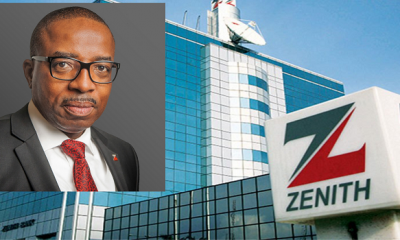

Zenith Bank Dismisses Report on GMD’s Arrest, Says Onyeagwu on Duty
-


EFCC Solicits For Zenith Bank, Others Help in the Probe of the Humanitarian Affairs Ministry
-
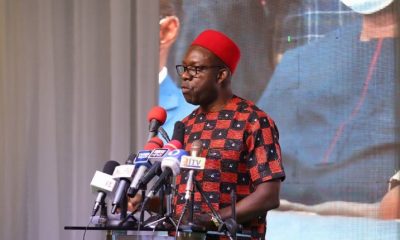

Anambra Government seals 24 banks, hotels over taxes
-
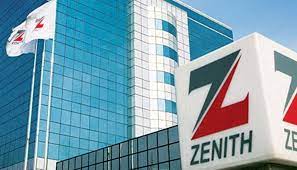

Court Orders Closure Of All Zenith Bank Branches Over Deputy-Governor’s N1.9B Entitlement
-
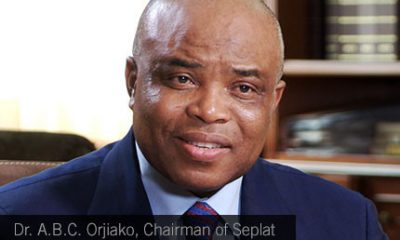

ZENITH BANK BATTLES SEPLAT BOSS, ABC ORJIAKO. COURT FREEZES HIS PERSONAL ASSETS, COMPANY FUNDS
-
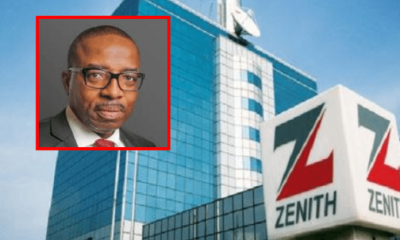

Ebenezer Onyeagwu: Zenith Bank GMD Preaches increased impact investment for Africa at global summit
News and Report
Yahaya Bello and the EFCC Quandary: The Devil is in the Details – Ayoola Ajanaku
Published
16 hours agoon
April 24, 2024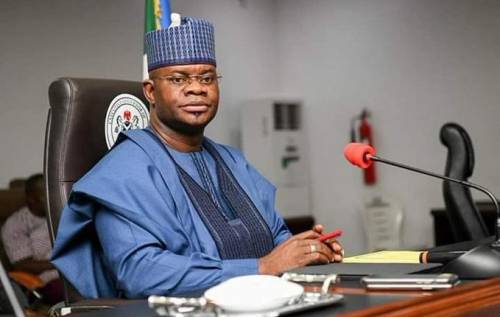
The dust is yet to settle, following the efforts of the Economic and Financial Crimes Commission (EFCC) to arrest the immediate past governor of Kogi State, Yahaya Bello last week, on the heels of the anti-graft agency preparation to arraign him over corruption charges. This development is more than what meets the eye, as it’s laden with intricate details that are the kernel of this lucid treatise.
The attempt to arrest the ex-governor led to the gestapo like siege to his residence located in Wuse Zone 4, FCT earlier. Officials of the EFCC cordoned off the road and entrance to the residence of the former Kogi State governor for most of Wednesday.
Despite the heavy presence of EFCC operatives around Bello’s residence, his successor in office, Usman Ododo, paid him a solidarity visit. Ododo arrived the erstwhile helmsman’s residence in the afternoon and was cheered by the loyalists of the former governor who were present to give support to their embattled principal.
Also, while the siege on Bello’s residence was still on, two conflicting court rulings emerged in respect to the attempt to arrest of the former governor by the EFCC. One of the rulings, which came from a Kogi State High Court sitting in Lokoja, restrained the EFCC from arresting, detaining or prosecuting Bello.
Justice I.A Jamil, who gave the order in a ruling last week, stated that infringing on the fundamental human rights of the former Kogi helmsman is null and void except as authorised by the Court.
“By this order, the EFCC is hereby restrained from arresting, detaining and prosecuting the applicant except as authorised by the Court.
“This is a definite order following the earlier interim injunction given,” he averred.
In another twist in the yoyo-like locomotion of multiple judicial pronouncements, however, the EFCC obtained permission from the Federal High Court sitting in Abuja to arrest the ex-Kogi State governor in preparation to his arraignment on Thursday.
Justice Emeka Nwite granted the warrant this afternoon at the instance of the EFCC.
Love or hate Yahaya Bello, the pertinent questions begging for answers in this litigation are:
The EFCC had in March indicted Yahaya Bello, in an alleged diversion of about N100 billion, an offence said to have been committed months before he assumed office as governor in September 2015. If any third party dissects the budgetary appropriation of Kogi State and it’s IGR dispassionately then the numbers do not add up. The former helmsman meet a humongous liabilities and backlog of non-serviced facilities accruing to the Confluence State that had to be serviced. The pervasive prevarication that colossal funds found it’s into his pockets amount to ‘Alice in Wonderland’ tales.
The anti-graft agency had joined Yahaya Bello in the amended suit alongside the Chief of Staff to Kogi State Governor, Alli Bello, and one Daudu Suleiman, who was re-arraigned by the anti-graft agency before Justice James Omotoso of the Federal High Court, Abuja.
The ex-governor was not a defendant in the original suit, and was not in court on the said day.
Justice Omotoso had granted an accelerated hearing in the matter and had also ordered that all forms of objections must be kept in abeyance till the address stage and the charge were read to them.
In the first count, the former governor, and the two suspects were accused of conspiring with each other in September 2015 and converting N80, 246, 470, 089 to their personal use. For contextual and editorial alignment, the goalposts of allegations have witnessed shifting and amendments.
What court Order did the EFCC appeal against as well as the reason behind it?
It is a germane fact in public domain that the EFCC appealed against the Order granted on the 9th of February, 2024 by the High Court of Kogi State, the said order was an order restraining the EFCC from inviting, arresting or detaining the Applicant vide Notice of Appeal filed on 26th February, 2024.
Also, the EFCC further asked for a stay of Execution of the Interim Order at the Court of Appeal on 21st of March, 2024, which request was refused by the Court of Appeal.
However, on the 6th of March, 2024, in defiance of the interim Orders and their own pending appeal against the interim Order, the EFCC proceeded to prefer a 17 Count(s) Charge before Justice Nwite of the Federal High Court against Yahaya Bello.
The EFCC went further to resort to self help when on the 17th of March, 2024, it approached the same Federal High Court, Abuja, via an Ex-parte application and without informing the said court of the interim Order and their pending appeal against the interim order, to obtain an arrest warrant against the same person in respect of whose Order they had appealed to the court of appeal.
Akin to the above, if indeed the EFCC has nothing to conceal, why are they trying to muddle up the issues on account of the main judgement that was also subsequently delivered in the same High Court of Kogi State without recourse to the interim order that they appealed against and requested to be stayed, which request was refused?
The EFCC claims to have extended invitation to Yahaya Bello’s quarter immediately after his tenure elapsed on January 27th 2024. He has challenged the anti-graft agency to produce a copy of this invitation, including the delivery date and the recipient’s name and endorsement. There’s ample confidence on his part that they cannot provide ample evidence to this effect.
This sudden attempt at trying to confuse unsuspecting public with sentimental press statements and mug shot poster emblazoned with wanted message in capital letters. These actions intended to impugn and malign Yahaya Bello would not help them clear the infraction and abuse of the judicial process to give a dog a bag name to hang it. It’s a recurring decimal and standard MO of the anti-graft agency to embark on the route of smear campaign on suspects in a bid to gain an edge in the gallery of public opinion.
Again, by the admission of EFCC to the effect that they were at the Court of Appeal on the matter, and at the same time, approached a Federal High Court without informing the court of the subsisting order and appeal, is an admission of abuse of judicial process, and a fraudulent deceit of the court that has led it to granting conflicting Orders while appeal was pending.
This approach is a grave infraction of due process of law, subsequently, the statement issued by the learned counsel representing EFCC in the said matter amounts to trying to justify the infraction in a media trial which is unethical and not allowed or recognized in the legal profession.
The NJC should seriously investigate this matter as the conduct of the EFCC lawyer is clearly unethical and smirks of “Jankara” and “Boju Boju” practice of circumventing due course of the law.
The EFCC had appealed the order on March 11, 2024 and sought a stay of execution in Appeal No: CA/ABJ/CV/175/2024: Economic and Financial Crimes Commission v. Alhaji Yahaya Bello. The Court of Appeal did not grant the stay of execution, but fixed yesterday for hearing.
The appeal, however, failed to take place as the registrar told journalists that the appeal was not listed among the cases for the day.
The latest development in this jurisprudential tango, the embattled immediate past Governor of Kogi State, Yahaya Bello said he was ready to appear before the Federal High Court in Abuja to answer to the 19-count charge the Economic and Financial Crimes Commission, EFCC, preferred against him.
Though Bello was absent for his arraignment, he briefed a team of lawyers who addressed the court on his behalf on Tuesday. A member of his legal team, Mr. Adeola Adedipe, SAN, told the court that his client would have made himself available for the proceedings, but all he clamours for is the strict adherence to the rule of law.
“The defendant wants to come to court but he is afraid that there is an order of arrest hanging on his head,” Adedipe, SAN, submitted.
Consequently, he urged the court to set aside the exparte order of arrest it earlier issued against the former governor.
Adedipe, SAN, contended that as at the time the order of arrest was made, the charge had not been served on his client as required by the law.
He noted that it was only at the resumed proceedings on Tuesday that the court okayed substituted service of the charge on the defendant, through his lawyer.
“As at the time the warrant was issued, the order for substituted service had not been made. That order was just made this morning.
“A warrant of arrest should not be hanging on his neck when we leave this court,” counsel to the defendant added.
Time will tell where the pendulum will swing, as Yahaya Bello is fighting a battle of his life to untangle himself from the charges filed by the Nigeria’s anti-graft agency earlier that has caught the attention of all and sundry.
In a nutshell, the pontification of prominent Lutheran pastor in Germany, Martin Niemoller rings a bell in this scenario. “First they came for the socialists, and I did not speak out—because I was not a socialist. Then they came for the trade unionists, and I did not speak out -because I was not a trade unionist. Then they came for the Jews, and I did not speak out – because I was not a Jew. Then they came for me – and there was no one left to speak for me.”
Regardless of his exact words, Niemöller’s message remained consistent: he declared that through silence, indifference, and inaction worse things happen. Alas, reverse is the case as in this part of the world an individual is not presumed innocent until proven guilty. The hounds and irate mob are out and baying for blood aided by apparatus of power with a predetermined ploy to have Yahaya Bello’s head on a plate via the guillotine.
Ayoola Ajanaku is a Communications and Advocacy Specialist based in Lagos, Nigeria.
News and Report
Breach of contract: Shell sues Venture Global in US court
Published
18 hours agoon
April 24, 2024
•As NLNG risks sanctions from UK court
Following restriction of Liquefied Natural Gas LNG supply to its customers, Shell PLC has made claims against Venture Global LNG(VGL) a United States based LNG exporter, for its breach of contract to supply LNG cargoes.
Also, Nigeria LNG may risk sanctions from a UK High Court for a similar breach of an LNG supply contract.
Both Venture Global LNG and NLNG have been facing hurdles in the United States and in the United Kingdom for its breach of contract in a relatively similar fashion.
While Shell Plc filed its claim with U.S. regulators, the NLNG breach, has now been advanced to the UK High courts for further litigation.
Nigeria LNG is challenging the enforceability of the arbitral award’s demand order, issued by the arbitration panel.
According to Reuters report, Shell Plc has escalated its dispute with Venture Global LNG.
It accused the liquefied natural gas producer of restricting supply access to it and other customers, while exporting over $18 billion in LNG.
In a letter sent to the Federal Energy Regulatory Commission, Shell requested the commission to compel Venture Global LNG to disclose plant commissioning data to clarify the cause of delayed commercial operations.
Shell and other European companies say they contracted with Venture Global LNG but did not get their gas cargoes under long-term contracts.
They alleged that Venture Global LNG has been selling gas from the plant for more than a year to others, costing them billions in lost profit.
On its part, Nigeria LNG was held to be in breach of contract by failing to deliver 19 cargoes under a contract it executed in January 2020.
The cargoes, which were due for delivery between October 2020 and October 2021, have not been delivered.
In pleadings made by NLNG in its Particulars of Claims to the High Court of Justice in England and Wales Commercial Court, it’s breach was confirmed by a final arbitration award dated 30th January 2023.
The arbitration tribunal comprised Mr John Beechey CBE, Mr J William Rowley KC and Mr Nevil Phillips.
Nigeria LNG Ltd., is significantly owned by Shell, Total, and Eni.
An industry expert cited similarities between the disputes involving Venture Global LNG and Nigeria LNG. The source attributed the challenge to the unexpected surge in the LNG market.
“The reason for this surge in disputes may be related to the unexpected turn in losses to highly profitable margins, as high as $90 million per cargo, at the beginning of the Russian Ukraine conflict, post Covid market recovery and a huge demand in Asia and European markets, it is seen as a golden era for LNG cargoes.
“This situation may have prompted numerous defaults on agreements, with major LNG suppliers opting to retain higher margins at the risk of lengthy litigations,” the source added.“
News and Report
We Have Put in Place definitive measures to Bolster our Production’ – Oando GCE, Wale Tinubu
Published
18 hours agoon
April 24, 2024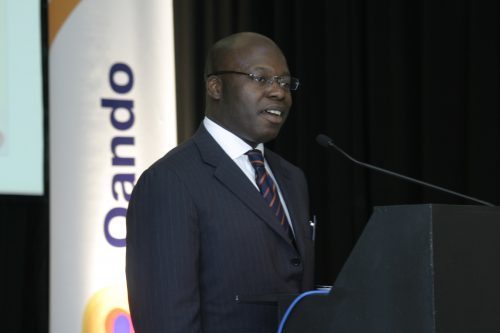
After releasing the FY 2022 financial statements, Oando Plc has issued a press statement to address its net loss of N81.2 billion incurred in 2022, citing militancy and pipeline vandalism as major culprits.
Despite reporting a gross turnover of N1.99 trillion during the fiscal year, the group posted a loss after tax of N81.2 billion, a significant downturn from the N39.2 billion profit after tax posted in 2021.
Wale Tinubu, Group Chief Executive of Oando Plc, commenting on the result, noted,
“The heightened militancy and pipeline vandalism acts within the Niger Delta region dealt a substantial blow to our upstream operations, resulting in a marked reduction in our crude production volumes due to the protracted shut-ins for repair following each incidence. This was further compounded by a major gas plant fire incident which also necessitated a lengthy downtime.”
“Furthermore, a rise in our net interest expense due to increased interest rates on several of our major facilities in line with global rates increases, also contributed to our Loss after Tax position.”
“In response, we have put in place definitive measures to bolster our production and cash inflows towards ensuring a speedy return to profitability by collaborating with our partners to institute a comprehensive security framework aimed at permanently curbing the persistent pipeline vandalism whilst concurrently exploring inorganic growth opportunities to increase our reserves and production capabilities. We have also implemented a strategic restructuring of our key facilities to ensure they align with our cash flow dynamics.”
Recommended reading: Pipeline vandalism cost Nigeria N471 billion in 5 Years
Economic implication of oil theft in Nigeria
Theft and vandalism of oil installations is a major problem plaguing the oil and gas sector in Nigeria. The crime of oil theft has had a negative impact on the national economy and the business of local and international oil companies operating in the upstream sector.
Although there is no precise figure to quantify the financial impact of oil theft on the Nigerian economy, a study conducted by Dimkpa et al. (2023) estimates that Nigeria lost approximately $33.6 billion in oil revenue to oil theft between 2019 and 2022.
A significant economic implication for Nigeria has been the consistent decline in oil production. Nigeria’s average oil production in 2022 was at 1.45 million barrels per day, an almost 1-million-barrel decline from the 2.4 million barrels per day produced by Nigeria in 2012.
In 2022, Oando’s total upstream production amounted to 20,703 barrels of oil equivalent per day (boe/day). This comprised 4,939 barrels per day of crude oil, 472 barrels per day of natural gas liquids, and 15,292 barrels per day of natural gas.
This figure represents a 22.7% decline from the 26,775 boe/d output reported by the group in 2021.
According to the company’s press statement, the decline in production was attributed to downtimes caused by shut-ins for repairs and sabotage activities.
In 2022, Oando Plc sold approximately 21.8 million barrels of crude oil, representing a 25% increase from the 17.4 million barrels sold in 2021. The group also sold about 1.94 million metric tonnes of refined petroleum, representing a 101% increase from the 962,371 metric tonnes sold in 2021.
Despite recording a decline in oil output, the group was able to sell an increased amount of crude oil due to its contracts with the then Nigerian National Petroleum Corporation (NNPC), ultimately contributing to its 148% revenue growth in 2022.
In 2022, Oando sold crude oil at an average realized oil price of $101.55/barrel and a gas price of $14.74/Boe, compared to 2021’s prices of $62.14/barrel for crude oil and $9.95/Boe for gas.
OMLs 60 to 63 gulped about $77.7 million in capital expenditure (CAPEX) from Oando, while OML 56 and OML 13 gulped about $22.6 million and $200,000 respectively. The group also spent $1.4 million in capital expenditure (CAPEX) on other assets.
As of 2022, Oando owned 20% stake in OMLs 60 to 63, as Nigerian Agip Oil Company (NAOC) also owned a 20% stake.
However, Oando is in the process of purchasing NAOC’s 20% stake in the oil fields, which will push its stake up to 40%.

An Icon of Service: NATCOM boss, Otunba Adejare Adegbenro’s Leadership Legacy

Audio Visual Rights Society of Nigeria (AVRS) Distributes Copyright Royalties for 2023 to Members..

Yahaya Bello and the EFCC Quandary: The Devil is in the Details – Ayoola Ajanaku

EXPOSED: HOW SACKED NNPC BOSS BILLY AGHA SPENT OVER N100 MILLION ON HIS GIRLFRIEND’S ARABIAN BIRTHDAY PARTY

Just In: Covid-19: Socialite Bolu Akin-Olugbade passed on at Paelon Covid Centre, Ikeja.

IMO PCC COMMISSIONER, WILLY AMADI IN VIRAL THREESOME SEX VIDEO SCANDAL

Trending
-

 Society6 years ago
Society6 years agoEXPOSED: HOW SACKED NNPC BOSS BILLY AGHA SPENT OVER N100 MILLION ON HIS GIRLFRIEND’S ARABIAN BIRTHDAY PARTY
-

 Society3 years ago
Society3 years agoJust In: Covid-19: Socialite Bolu Akin-Olugbade passed on at Paelon Covid Centre, Ikeja.
-

 Society3 years ago
Society3 years agoIMO PCC COMMISSIONER, WILLY AMADI IN VIRAL THREESOME SEX VIDEO SCANDAL
-

 News and Report5 years ago
News and Report5 years agoStanbic IBTC In Trouble As Supreme Court Orders Bank To Pay Customer ₦2.5Billion
-

 News and Report6 years ago
News and Report6 years agoDelta 2019: Gov. Okowa’s ambition cripples Asaba Airport upgrade…. • As ULO Construction Company pulls out • Okowa allegedly diverts N1.5Bn budgeted for the project
-
News and Report7 years ago
More Queen’s College pupils take ill…• Parents call for prosecution of ex-principal
-

 News and Report5 years ago
News and Report5 years agoGTBank Releases 2018 Full Year Audited Results …….. Reports Profit before Tax of ₦215.6 Billion
-
News and Report6 years ago
GTBank Releases H1 2018 Audited Results, Reports Profit Before Tax Of ₦109.6 Billion






